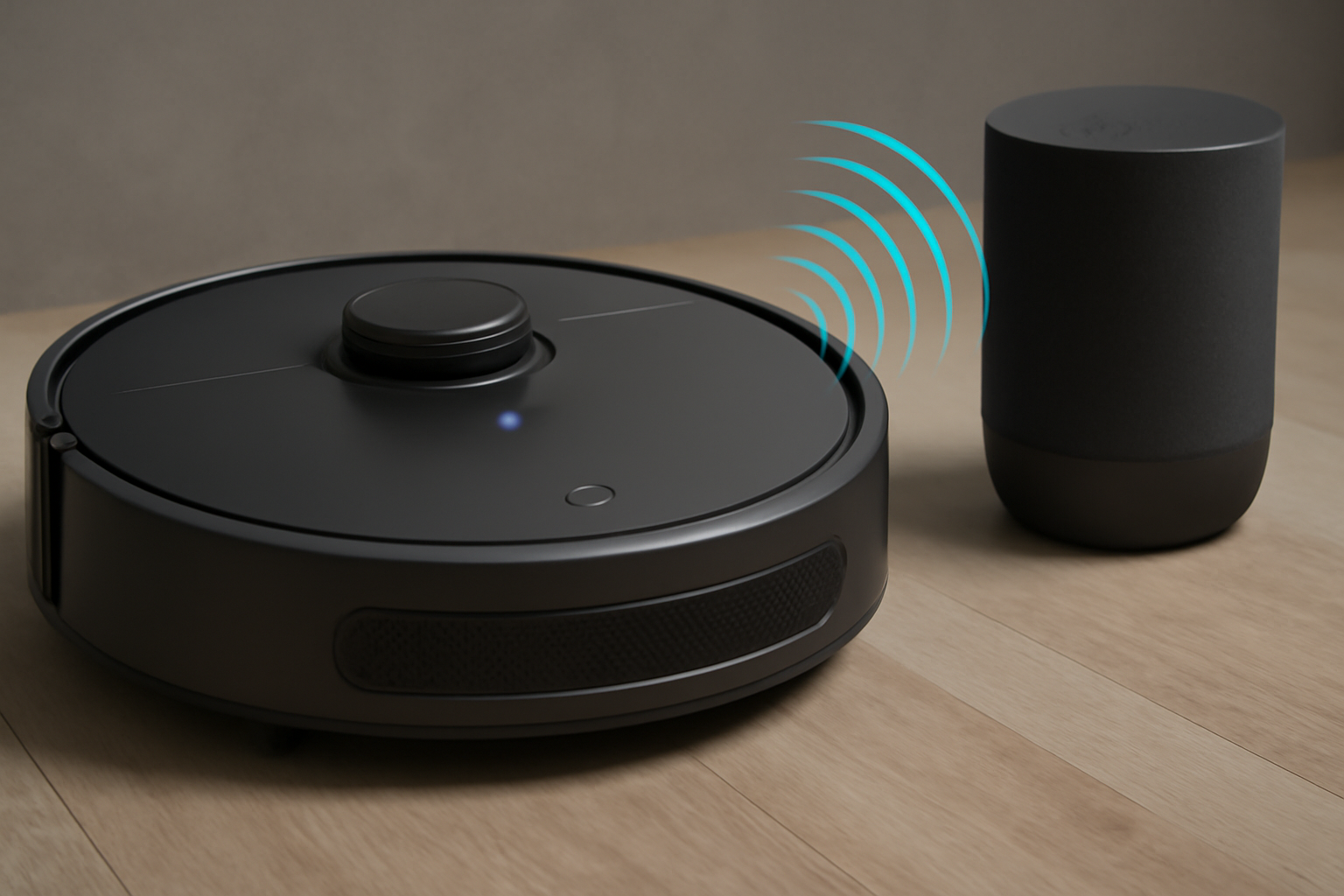
Optimized High-Density Edition for EU & Middle Eastern Importers, Distributors, and R&D Engineers
🔍 1. Why This Rumor Matters: The Viral Panic Is Fake — But Its Business Impact Is Real
Across Western and Middle Eastern social media, the claim “your vacuum is secretly listening to you” spreads faster than any official clarification.
The problem isn’t the rumor’s accuracy — it’s the commercial damage it causes.
For procurement teams, distributors, engineering heads, and supply-chain managers, misinformation triggers very real consequences:
Increased customs inspections for IoT devices
Retailer hesitation or listing removals
Negative customer sentiment and higher return rates
Competitors exploiting the rumor during tenders
Compliance documentation demands from partners
This is why industry stakeholders must understand what data vacuums actually collect, where real risks exist, and how to protect product lines from misinformation-driven disruption.
📡 2. What Smart Vacuums Collect — The Real Engineering-Level Facts
Modern Household Vacuum Cleaners rely on specific data types that enhance performance and ensure safety.
Here is the transparent, procurement-friendly breakdown:
✔ Safe, Non-Sensitive Data (Used by All Smart Vacuums)
1. Mapping & Navigation Data
From lidar or ToF modules — used to build floor maps, but contains no personal identity data.
2. Internal Telemetry
Temperature, RPM load, brush resistance, battery cycles — essential for stability in high-performance units like a High Suction Vacuum Cleaner.
3. Airflow & Dust Monitoring
Used to detect clogs, optimize airflow, and improve cleaning efficiency.
✖ Data Vacuums Do NOT Collect (Despite Viral Claims)
Audio recordings
Voice conversations
Personal identity data
Photos or videos
Biometric information
Most vacuums do not even include microphone hardware — especially Quiet Vacuum Cleaner models, where engineering efforts focus on noise suppression, not sound capture.
🛠️ 3. The Real Security Risks: They Don’t Come From the Vacuum — They Come From the Supply Chain
Our audits across factories in China, Vietnam, Malaysia, Turkey, and Thailand reveal a clear truth:
Hardware is rarely the problem.
Uncontrolled components and weak firmware processes are.
1. Third-Party Mobile App SDKs
Some factory apps embed analytics SDKs without disclosure.
2. Unsigned Firmware
Allows unauthorized version changes or exploit opportunities.
3. Component Substitution
MCUs or communication chips may be replaced without approval when shortages occur.
4. Non-Compliant Cloud Servers
Server locations outside GDPR- or PDPL-compliant regions create hidden liabilities.
These vulnerabilities have nothing to do with microphones — but everything to do with procurement risk.
Even non-robotic categories like Upright Vacuum Cleaners, Wet and Dry Vacuum Cleaner models, or Apartment Vacuum Cleaner units may involve firmware components that require audit.
🧰 4. The Procurement “Must-Ask” Checklist — Used by Top EU & GCC Buyers
To avoid regulatory failures, warranty losses, or product delisting, procurement teams should require:
✔ Firmware Security Documentation
Signed, encrypted OTA
Version lock and rollback prevention
Full OTA release records
✔ Component Transparency
Verified BOM with chip origin
Confirmation of no hidden wireless modules
PCB/Gerber approval before tooling
Declaration of RF modules (mandatory in GCC)
✔ Cloud & App Compliance
Server geolocation disclosure
Data-retention policy
Permission mapping for mobile apps
Third-party SDK transparency
✔ Independent Penetration Testing
Reports from TÜV, SGS, Intertek, or Dekra significantly reduce supplier risk.
✔ Engineering Validation
airflow design quality
thermal protection
brush-load control
sealing for a HEPA Filter Vacuum Cleaner
hair-resistant brush structures in a Vacuum Cleaner for Pet Hair
These are now essential for Vacuums Procurement at any professional level.
📉 5. Why Social Media Loves “Listening Vacuum” Claims — And How Brands Can Fight Back
The rumor spreads because of three simple patterns:
1. Sensors look like cameras
Lidar modules resemble lenses to non-technical consumers.
2. Fear spreads faster than facts
Emotional content earns more views than technical explanations.
3. Algorithmic amplification
Platforms push dramatic content, not accurate content.
To counter this, leading distributors now publish:
PCB tear-down photos
Firmware signing screenshots
Cloud server country lists
App permission diagrams
R&D privacy FAQs
This shifts customer perception from fear → trust.
🛡️ 6. How Engineers Build “Secure-by-Design” Vacuum Cleaners
A secure vacuum is engineered from the PCB layout to the cloud interface.
✔ Hardware-Level Protection
No unused sensor footprints
Shielding around wireless modules
Motor chamber acoustic engineering for Quiet Vacuum Cleaner designs
Airflow optimization for stable suction
✔ Software-Level Protection
Local-first processing, cloud-second
Encrypted telemetry
Permission-isolated app architecture
Signed OTA firmware
✔ User-Centered Privacy Controls
Minimal required app permissions
No mandatory cloud pairing
Offline cleaning functionality
This engineering philosophy helps reduce compliance challenges in Vacuum Cleaner Distribution pipelines.
⚙️ 7. What This Means for 2025–2026 EU & Middle Eastern Procurement
Regulatory pressure in the EU and GCC is rising quickly:
EU Cyber Resilience Act
UAE PDPL
Saudi SDAIA
Turkey KVKK expansions
Non-compliant products risk:
customs holds
retailer bans
marketplace delisting
insurance claims or penalties
full product recalls
Meanwhile buyers increasingly ask for:
component traceability
firmware signing proof
cybersecurity reports
cloud data transparency
The brands that win will be the ones that treat trustworthiness as a specification, not a slogan.
🏁 Final Takeaway: Vacuums Don’t Spy — But Uncontrolled Supply Chains Can Damage Your Business
The rumor is false.
Vacuum cleaners do not listen to conversations.
But supply-chain weaknesses — unsecured firmware, substituted components, third-party SDKs, or undocumented servers — can create very real commercial and compliance risks.
For EU and Middle Eastern importers, distributors, engineers, and procurement leaders:
The strongest market position will belong to companies that combine technical transparency, supplier accountability, and secure-by-design engineering.
📌 Hashtags
#UprightVacuumCleaners #HouseholdVacuumCleaners #HighSuctionVacuumCleaner #QuietVacuumCleaner #VacuumsProcurement #VacuumCleanerDistribution #VacuumCleanerForPetHair #HEPAFilterVacuumCleaner #WetAndDryVacuumCleaner #ApartmentVacuumCleaner #Lanxstar #SmartHomeVacuums #IoTVacuumSafety #SecureApplianceDesign #VacuumCleanerImporter #MiddleEastApplianceMarket #EuropeVacuumDistributor #SmartVacuumFirmware #DataPrivacyAppliances #VacuumEngineering #MotorOptimization #LowNoiseVacuumTech #PetHairSolutions #HEPAAllergyControl #DustCollectionTech #HighAirflowDesign #VacuumCleanerOEM #ApplianceODM #SupplyChainRiskControl #CybersecurityAppliances #SmartHomeCompliance #FloorCleaningTechnology #DeepCleaningSolutions #SuctionPowerEngineering #SmartHomeSafety #RoboVacSecurity #HomeApplianceProcurement #RetailerCompliance #VacuumProductTesting #FirmwarePenetrationTesting #BOMVerification #ComponentTraceability #ApplianceRAndD #VacuumBranding #GlobalApplianceSourcing #NoiseReductionEngineering #AirFiltrationSystems #SmartApplianceTrends #2025VacuumMarket
















